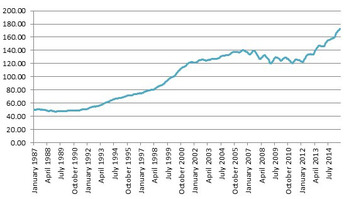Case-Shiller: Denver Ties for 1st Place10/28/2015  Homes in the Denver skyrocketed by 10.7 percent in August, tying the metro area with San Francisco for the No. 1 spot on the closely watched Case-Shiller index released today. The year-over-year percentage gain ties a record Denver set in August 2001, according to the S&P/Case-Shiller Price Indices, which tracks home sales in 20 major metropolitan statistical areas. The last time Denver homes rose by 10.7 percent, the average 30-year, fixed-rate mortgage was 6.95 percent, compared with 3.91 percent in August of this year and the inflation rate in August 2001 was 2.72 percent, more than 10 times higher than the inflation rate of 0.2 percent in August. August also marked the 42nd consecutive month that home prices in the Denver area have set a record, according to Case-Shiller. However, given the housing appreciation, tracked by Case-Shiller and other groups including the Denver Metro Association of Realtors, the Colorado Association of Realtors and Zillow, affordability is a big issue, especially for first-time home buyers. “When the construction defect issues are resolved, we will start seeing more entry-level condos being built, instead of all of these apartment buildings,” Bauer said. Anthony Rael, chairman of the DMAR Trends Committee and a broker with RE/MAX Alliance, agrees. “We’ve been worried about housing affordability every month for the past 18 months,” Rael said. “Every mayor in the country, and especially mayors in Denver and the surrounding areas, are especially worried about housing affordability,” he said. It is increasingly tough for builders to bring entry-level homes to the market, he said. “With rising labor costs, rising land costs and still high material costs, the economics are such that it is really hard to build affordable houses,” Rael said. “I don’t know what the answer is,” especially since it is hard to convince politicians and taxpayers that affordable housing needs to be subsidized, he said. He is increasingly seeing sellers with homes in the $500,000-plus range dropping the asking price by as much as $30,000. “I think these sellers missed the market,” and find they can’t match the frenzy of last summer, he said. “But starting in late February, unless we see a plethora of new listings dumped on the market, which I don’t expect, I think we are going to start this cycle all over again,” Rael said. “Hopefully, it won’t be quite so frenzied; I think last summer was unprecedented. I hope it is. It would be pretty scary if we had another summer like that, as the kind of price appreciation we saw last summer is not sustainable and not healthy for the overall market and the economy.” Still, Rael was not surprised by the 10.7 percent gain in the Case-Shiller report. “It is pretty consistent with that the Denver Metro Association of Realtors, the Colorado Association of Realtors and others reported,” Rael said. On a national front, there is a lot of good housing news to report. “Home prices continue to climb at a 4 percent to 5 percent annual rate across the country,” said David M. Blitzer, Managing Director and Chairman of the Index Committee for S&P Dow Jones Indices. “Most other recent housing indicators also show strength,” Blitzer continued. “Housing starts topped an annual rate of 1.2 million units in the latest report with continuing strength in both single family homes and apartments,” Blitzer said. “The National Association of Home Builders sentiment survey, reflecting current strength, reached the highest level since 2005, before the housing collapse. Sales of existing homes are running about 5.5 million units annually with inventories of about five months of sales,” he said. However, September new home sales took an unexpected and sharp drop as low inventories were cited as a possible cause. “A notable part of today’s economy is the continuing low inflation rate; in the year to September, consumer prices were unchanged,” Blitzer said. “Even excluding food and energy, the core inflation was 1.9 percent. One result is that a 5 percent price increase in the value of a house means more today than it did in 2005-2006, the peak of the housing boom when the inflation rate was higher,” Blitzer explained. “The rebound from the recent lows was faster than the 1997-2005 housing boom, and also much less driven by inflation,” he concluded. Scott Synovic is a top performing mortgage loan originator providing superior levels of service and satisfaction to clients and business partners in Colorado - www.scottsynovic.com NMLS #253799 Fairway Independent Mortgage Corporation #2289
Comments are closed.
Archives
February 2023
Categories |
Popular Pages |
Company
|

Equal Housing Lender licensed through NMLS Regulated by the Division of Real Estate. Licensed Mortgage Loan Originator licensed in Colorado and California. Not endorsed or sponsored by either state or any government agencies.







 RSS Feed
RSS Feed